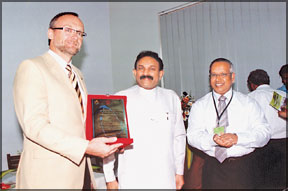Plans to double paddy yield
The potential for doubling paddy yield in the next few years with the
use of improved high yielding paddy varieties coupled with advanced
production and protection technologies was stressed by Agriculture
Minister Hemakumara Nanayakkara at the opening ceremony of the new Rice
Technology Training Centre at the Rice Research and Development
Institute, Bathalagoda on January 26.
|

An award was presented recently to Dr. R.A. Dobermann, the
Deputy Director General of the International Rice Research
Institute of Philippines, by Agriculture Minister Hemakumara
Nanayakkara for the cooperation extended in rice breeding
activities in Sri Lanka. Dr. Nimal Dissanayaka, the Director
of the Rice Research and Development Institute of
Bathalagoda, also participated in this occasion. |
Minister Nanayakkara stated that the present Rice Research and
Development Institute at Bathalagoda was started as a rice breeding
station in 1952.
It has not only been upgraded as the premier rice research institute
of the country, but presently recognized internationally due to its
excellent performance in rice breeding during the past several years.
This institute has not only bred rice varieties adaptable to
different agro-ecological regions of this country, but it has also been
successful in developing rice technologies that enable enhancement of
yield.
These varieties have been introduced to the farmers who have adopted
them with an acceptance level of over 95 per cent. These advances in
varietal development and dissemination among rice farmers have enabled
the nation achieve targets for self-sufficiency in this staple cereal.
It is in regard that the above training centre has been established
for the dissemination of appropriate technologies among farmers.
The potential yield of the new high yielding rice varieties under
experimental conditions range from 8-10 metric tons per hectare.
However, the farmers have not been able to achieve this yield due to
various constraints at field level and the national yield remains at 4.2
metric tons per hectare.
A wide yield gap exists and it is necessary to bridge this yield gap
early. Therefore, this training centre could be used to overcome these
constraints by training farmers, extension workers as well as the
researchers in technology dissemination.
Wayamba Province Governor R. Balalle, Deputy Agrarian Services
Minister Siripala Gamlath, Ranjith Wijethilaka, Secretary of the
Ministry of Agricultural Development and Agrarian Services and Dr. C.
Kudagamage, Director General, Department of Agriculture also
participated. |



